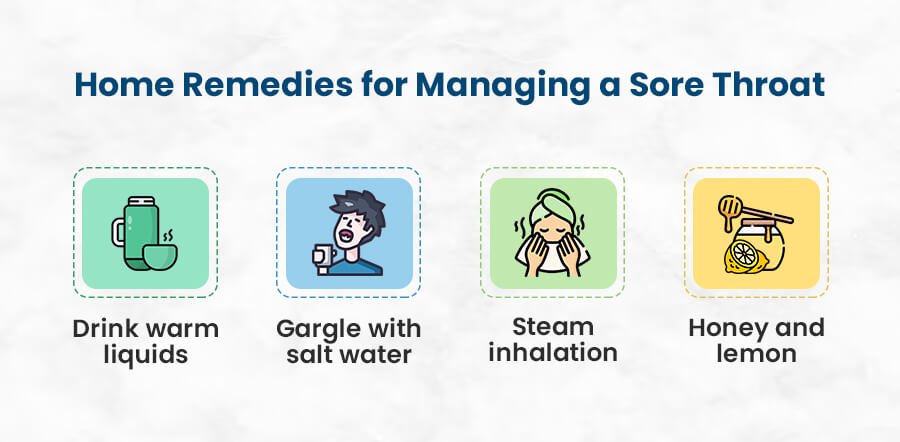A sore throat can be a very uncomfortable and irritating experience, especially for seniors who have a weakened immune system. Moreover, older adults, who are more prone to developing serious health problems, are also at a higher risk of transmitting infections due to a sore throat. To avoid it, seniors should take preventive measures such as maintaining good hygiene, avoiding contact with sick individuals, and reducing exposure to irritants such as smoke and chemicals. Fortunately, there are several effective home remedies and medications that can alleviate symptoms and help seniors feel better quickly.
To understand the root cause of a sore throat, it’s important to be aware of the common causes.
Table of Contents
Common Causes of a Sore Throat in Seniors
– Viral infections such as the common cold, flu, and mononucleosis
– Bacterial infections such as strep throat, tonsillitis, and sinusitis
– Allergies to substances such as dust, pollen, and pet allergens can cause inflammation and a sore throat.
– Dry air, especially in winter, can cause a sore throat due to lack of humidity.

Symptoms to watch for
Sore throat symptoms can appear within a few hours to a few days after exposure to a virus or bacteria. Some of the most common symptoms of a sore throat include:
- Pain or discomfort when swallowing
- Redness or swelling in the throat
- Scratchiness or itchiness in the throat
- Hoarseness or loss of voice
- Dry cough
- Fever
- Fatigue
- Swollen lymph nodes in the neck
Home Remedies for Managing a Sore Throat
A sore throat can be a discomfort that can affect the sleep of the elderly, even if it is not severe enough to see a physician. To relieve the pain and irritation, they can try some home remedies. The home remedies discussed below can be effective for mild or typical sore throat cases. However, seniors can consult a primary care health specialist at EliteCare to discuss the symptoms if the sore throat is painful or has been persistent for several days.
Some of the best home treatments for sore throat seniors as well as others, can follow area:
Drinking warm liquids
A sore throat can be soothed by drinking warm beverages such as tea, warm water, and by consuming soups like chicken broth or vegetable soup. The warmth and hydration can help reduce throat inflammation and reduce pain. Additionally, hot beverages can loosen mucus and phlegm in the throat and chest, making it easier to cough them up and clear the airways. Seniors must avoid consuming liquids that are too hot as this can further irritate the throat. Instead drinking warm liquids regularly can provide relief and make it easier for seniors to eat, drink, and speak without discomfort.
Gargling with salt water
Gargling with warm salt water is a simple and effective home remedy. Saltwater helps to relieve swelling and kill bacteria in the throat. Salt helps to reduce swelling in the mouth and throat by drawing out water from the oral tissues. It creates a barrier of salt that blocks water and harmful bacteria from entering the area again. Mix half a teaspoon of salt in a glass of warm water and gargle several times a day. It’s important to ensure that the water is warm but not too hot to avoid causing any additional discomfort.
Steam inhalation
Steam therapy or steam inhalation involves breathing in steam to relieve various respiratory issues, including sore throat. The moist heat from the steam helps to hydrate the throat and reduce the pain and discomfort associated with a sore throat. This remedy can be performed by sitting in a bathroom with a hot shower running or holding one’s face over a bowl of hot water and breathing in the steam. A towel can be draped over the head to help trap the steam. Adding essential oils, such as eucalyptus or peppermint, to the steaming water can enhance the experience and provide additional benefits, such as relieving congestion and reducing pain, but they can also cause side effects, especially when used in high doses or for an extended period. Seniors with allergies, asthma, or other respiratory conditions should exercise caution when using these oils and make sure to dilute them properly before adding them to the steam water.
Honey and lemon
A combination of honey and lemon provides a natural source of antioxidants and has antimicrobial properties. According to a study, honey effectively treats throat infections and soreness. To use this remedy, mix a tablespoon of honey with freshly squeezed lemon juice and warm water and drink the mixture several times a day. The warm water helps to soothe the throat, while the honey and lemon provide additional relief.

Over-the-Counter Medications for a Sore Throat
It is always advisable to consult a primary care physician prior to taking any drugs, especially for seniors who may have preexisting health issues or are taking other treatments. Some over-the-counter remedies may interact with other medications and result in adverse reactions.
Pain relievers
Pain relievers such as acetaminophen or ibuprofen can help relieve sore throat issues. Ibuprofen can cause stomach irritation and bleeding, so it is advisable to speak with a senior care service provider before using it. Please check the dosage with the health care provider or pharmacist.
Decongestants
They help to relieve nasal and sinus congestion associated with a cold or flu by narrowing the blood vessels in the nasal passages, reducing swelling, and allowing for better breathing. Decongestants can be taken as oral medications, nasal sprays, or drops. It is essential to follow the recommended dosages for decongestants and stay within the maximum recommended dose in 24 hours.
Throat lozenges
They provide a numbing effect and stimulate the production of saliva, which helps moisturize the throat. There are many flavors and types of throat lozenges available, including those with numbing agents like benzocaine, menthol, or eucalyptus to relieve congestion, and others with cough suppressants like dextromethorphan. While throat lozenges can temporarily relieve a sore throat, it’s important to keep in mind that they do not cure the underlying cause. Additionally, some people may experience side effects from taking throat lozenges, such as digestive problems, headache, or an allergic reaction.
When to Seek Medical Attention?
– If symptoms persist for more than a week, it may indicate a persistent infection or another underlying issue that needs to be addressed by a healthcare provider.
– In addition to a sore throat, high fever, or difficulty breathing in seniors could indicate a serious condition and require immediate medical attention. If a senior also experiences symptoms like fatigue, muscle or body aches, headache, loss of taste or smell, congestion, nausea, or diarrhea, it may be a sign of COVID-19. A proper diagnosis can only be made by a healthcare professional.
To reduce the risk of contracting COVID-19, seniors must take precautions such as wearing a mask, practicing good hygiene, and using hand sanitizers to help kill any lingering viruses on the hand after touching a contaminated surface. Additionally, it is essential to stay up to date on Covid vaccinations.
– If there is a history of a weakened immune system or underlying medical conditions, such as diabetes or heart disease, the risk of complications from a sore throat may be higher.
– If seniors experience severe pain or difficulty swallowing, notice any changes in their voice or speech, or if they have a persistent cough or congestion. It is always better to be safe and seek medical advice early on.
Takeaway
While home remedies can provide temporary relief, they are not a substitute for medical treatment and should not be relied upon as the sole treatment method. Some home remedies may not be safe or effective for seniors, especially those with underlying medical conditions or weakened immune systems. For example, over-the-counter cough and cold medicines can have harmful side effects and may interact with other medications a senior is taking.
Generally, seniors should visit a medical clinic and follow their primary care physician’s advice and treatment plan. This will ensure that the underlying cause of the sore throat is diagnosed correctly and treated and will help prevent potential complications and the spread of infection. It is crucial for seniors to recognize the issue and consult a senior care service at the earliest to prevent any further complications.










